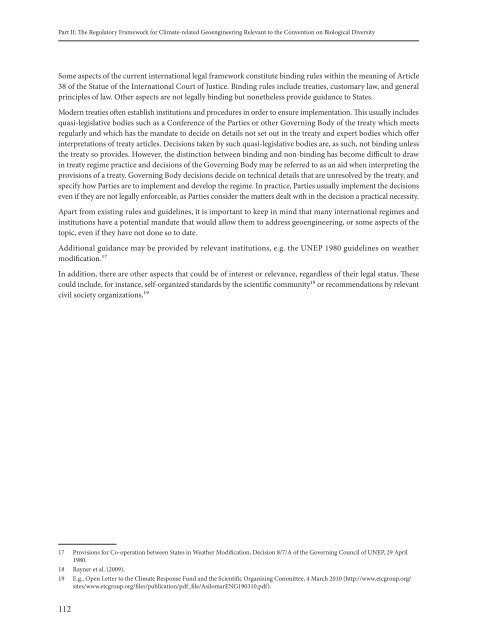cbd-ts-66-en
cbd-ts-66-en
cbd-ts-66-en
Create successful ePaper yourself
Turn your PDF publications into a flip-book with our unique Google optimized e-Paper software.
Part II: The Regulatory Framework for Climate-related Geo<strong>en</strong>gineering Relevant to the Conv<strong>en</strong>tion on Biological Diversity<br />
Some aspec<strong>ts</strong> of the curr<strong>en</strong>t international legal framework constitute binding rules within the meaning of Article<br />
38 of the Statue of the International Court of Justice. Binding rules include treaties, customary law, and g<strong>en</strong>eral<br />
principles of law. Other aspec<strong>ts</strong> are not legally binding but nonetheless provide guidance to States.<br />
Modern treaties oft<strong>en</strong> establish institutions and procedures in order to <strong>en</strong>sure implem<strong>en</strong>tation. This usually includes<br />
quasi-legislative bodies such as a Confer<strong>en</strong>ce of the Parties or other Governing Body of the treaty which mee<strong>ts</strong><br />
regularly and which has the mandate to decide on details not set out in the treaty and expert bodies which offer<br />
interpretations of treaty articles. Decisions tak<strong>en</strong> by such quasi-legislative bodies are, as such, not binding unless<br />
the treaty so provides. However, the distinction betwe<strong>en</strong> binding and non-binding has become difficult to draw<br />
in treaty regime practice and decisions of the Governing Body may be referred to as an aid wh<strong>en</strong> interpreting the<br />
provisions of a treaty. Governing Body decisions decide on technical details that are unresolved by the treaty, and<br />
specify how Parties are to implem<strong>en</strong>t and develop the regime. In practice, Parties usually implem<strong>en</strong>t the decisions<br />
ev<strong>en</strong> if they are not legally <strong>en</strong>forceable, as Parties consider the matters dealt with in the decision a practical necessity.<br />
Apart from existing rules and guidelines, it is important to keep in mind that many international regimes and<br />
institutions have a pot<strong>en</strong>tial mandate that would allow them to address geo<strong>en</strong>gineering, or some aspec<strong>ts</strong> of the<br />
topic, ev<strong>en</strong> if they have not done so to date.<br />
Additional guidance may be provided by relevant institutions, e.g. the UNEP 1980 guidelines on weather<br />
modification.17<br />
In addition, there are other aspec<strong>ts</strong> that could be of interest or relevance, regardless of their legal status. These<br />
could include, for instance, self-organized standards by the sci<strong>en</strong>tific community18 or recomm<strong>en</strong>dations by relevant<br />
civil society organizations.19<br />
17 Provisions for Co-operation betwe<strong>en</strong> States in Weather Modification, Decision 8/7/A of the Governing Council of UNEP, 29 April<br />
1980.<br />
18 Rayner et al. (2009).<br />
19 E.g., Op<strong>en</strong> Letter to the Climate Response Fund and the Sci<strong>en</strong>tific Organizing Committee, 4 March 2010 (http://www.etcgroup.org/<br />
sites/www.etcgroup.org/files/publication/pdf_file/AsilomarENG190310.pdf).<br />
112


